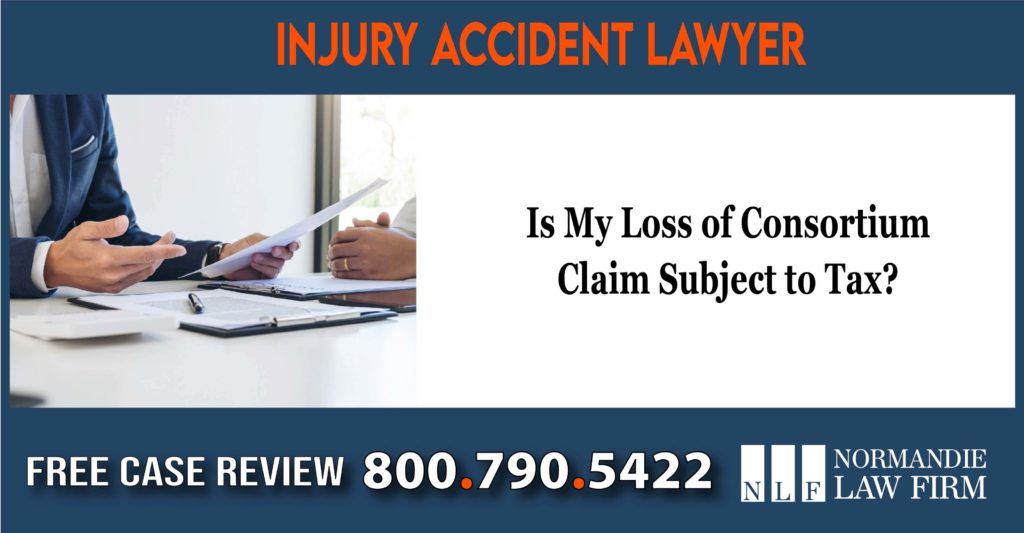When most people think of payment from a personal injury lawsuit, they think about the losses incurred by the victim due to another party’s negligence. But loved ones of the victim suffer as well, especially if the accident caused or long-term of lifelong consequences, including significant disruptions to the relationship between spouses or domestic partners. That’s why loss of consortium is a possible award in cases of personal injury. This is a form of compensation that’s paid to spouses and partners, who have lost out on the love, companionship, and emotional support from their significant partner due to an accident that was caused by someone else.
One question many people have concerns the taxation of payments from an accident injury case. Specifically, is a loss of consortium claim subject to tax? Generally, compensatory damages, such as loss of consortium, are not taxable since they are considered “earned income.” However, there are exceptions that allow for the taxation of certain damages, which are a part of your settlement award.
This article will explore the topic of taxability on settlements from a personal injury award, along with other information that can provide you with an understanding of your rights and legal options. As this information is meant for general purposes only, please contact our law firm if you have specific questions or concerns about your case.
Our Recent Verdicts and Settlements
$22 Million
$2.25 Million
$1.5 Million
$1.1 Million
$734,851
$2.3 Million
What is Loss of Consortium?
A claim for loss of consortium is technically a separate lawsuit from an injury claim that’s filed by the victim. This type of action is brought by the registered domestic partner or spouse of the person that was harmed or killed by an act of negligence. However, these cases are typically filed in conjunction with the personal injury or wrongful death lawsuit, which is why we often think of them as part of the same legal action.
According to California Civil Jury Instructions 3920, loss of consortium is
the “loss of love, companionship, comfort, care, assistance, protection, affection, society, and moral support, losing the enjoyment of sexual relation, or the ability to have children.”
Based on this definition, you would need to prove that there the accident in question caused significant changes in your partner’s behavior and/or abilities. As a result, you have been denied specific privileges and benefits that you would have had, such as marital relation and the ability to have children. Furthermore, you would need to be in a legally binding union with the victim, i.e., marriage or registered domestic partners as defined by California law. Thus, you would not be entitled to loss of consortium if you were just dating the victim or living with them.
There is no cap on the amount of loss of consortium that can be awarded to the spouse or partner. In essence, a jury has free rein to determine how much you are owed for the loss or damage to the relationship between you and your loved one. Basically, the severity and complications from the injury (disability, psychological damage, etc.) will determine the size of your award.
Taxes of Personal Injury Settlements by the State of California
A settlement from a personal injury lawsuit may include two types of damages: compensatory and punitive. Compensatory damages include economic (special) damages and non-economic (general) damages. Economic damages refer to medical costs, lost wages, and other things that can be calculated as direct monetary losses. Non-economic damages, on the other hand, refer to intangible losses, like pain and suffering, mental anguish, and loss of consortium.
Compensatory damages from an injury claim are generally non-taxable, which is good news if you are a spouse or domestic partner who is eligible to file for loss of consortium.
But as we mentioned before, specific portion of your award may be taxable by the California Department of Tax. You may, for example, receive punitive damages from the jury if the defendant’s negligence was especially outrageous. This is an additional sum on top of your settlement award, which makes it subject to taxes in the state of California. You will also need to pay taxes on any portion of your settlement that exceeds the value of your economic losses. As an example, let’s say your car was totaled in a crash that was caused by a reckless driver. The value of your car is $30,000, but you are awarded $50,000 from an accident injury case. That means you received $20,000 in excess of what your car is worth, and that portion would be subject to tax.
For more information on the parts of your settlement that may be taxable by the California Department of Tax, contact us to speak with an experienced personal injury lawyer.
Taxation by the Federal Government on Personal Injury Awards
Now, let’s talk about the taxability of a personal injury settlement by the federal government. Like the state of California, the IRS typically excludes personal injury awards from their list of taxable income. In essence, you do not need to report the compensation you receive for injuries that were caused by someone else. These injuries include emotional distress and mental anguish, as long as they are stem from the physical injuries you’ve sustained from the accident.
On the other hand, punitive damages and the interest accrued are taxable by the IRS, along with some other forms of compensation, such as:
- If the victim’s settlement is solely based on mental anguish / emotional distress (not stemming from a physical injury), those damages are taxable under federal law.
- You must notify the IRS of any medical expenses associated with the accident if they were claimed on a previous tax return.
- The IRS cannot tax you on lost wages that are a direct result of the physical injury from your accident. However, all other forms of lost wages are subject to tax.
Due to the intricacies in state and federal tax laws, it’s crucial to itemize all deductions relating to your injuries, along with medical records and other supporting documents. We can help you with this process and ensure that you are in full compliance with IRS regulations.
Can the IRS Collect Back Taxes from my Settlement?
Yes, the Internal Revenue Service has the right to collect back taxes from a punitive damages award (or the interest accrued) if they have placed a lien on your assets. For many that owe back taxes, this usually happens when you deposit the check into their bank account. However, the process is ultimately based on many factors that are unique to you and your situation with the IRS. That’s why you should speak to a lawyer who is knowledgeable in the taxation of personal injury awards.
We know that taxes can be a source of frustration and anxiety, especially if you are dealing with the aftermath of a serious accident. Help is available at our law firm, so contact us today for a free case evaluation.
Contact Normandie Law Firm
The personal injury attorneys of Normandie have spent decades in the fight to bring justice to accident victims and their loved ones. We know how confusing the laws can be, especially when you are trying to navigate the claims process and fight for the compensation you deserve. To protect your interests, it’s best to retain the services of a lawyer with experience in accidents and wrongful death cases.
Our attorneys provide free legal a service under the Zero Fee Guarantee. This includes free second opinions if you have a claim or lawsuit that you have concerns about. Whether you are starting the legal process or switching to us from another law firm, you pay $0 in legal fees. Our payment comes to us as a part of your compensation award; if we don’t recover your settlement, you owe us absolutely nothing.
Please contact our office to schedule a free case review and learn about your legal options if you or your loved one was injured in an accident.













